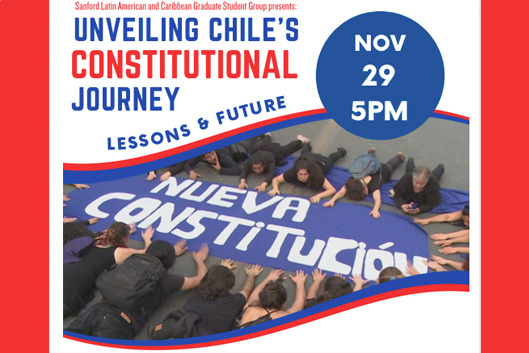Unveiling Chile's Constitutional Journey: Lessons and Future

Join us for a discussion with Benjamín Alemparte (Ph.D. Duke Law) and Luís Eugenio García-Hidobro (J.S.D. Yale Law), facilitated by Jorge Delgado Golusda Rotary Peace Fellow at MIDP, Duke University.
Constitutional Law Researcher Benjamín Alemparte Prado and Professor Luís Eugenio García-Huidobro will discuss the tumultuous process of the writing of a new Chilean Constitution. A first attempt, which drafted a new, rights-based, post-Pinochet era constitution for Chile, was put to a mandatory national plebiscite (referred to as the 'exit plebiscite') on 4 September 2022. The proposed constitution was rejected by 62% to 38%. However, reforming the dictatorship-inherited constitution was ongoing, and many lessons have been learned along the way regarding the obstacles and opportunities entailed in undertaking rights-based constitutional reform.
According to Reuters, on Nov 7, Chilean President Gabriel Boric called for a new national referendum on a second proposal to replace the country's dictatorship-era constitution. The document was finalized a week prior by a Constitutional Council charged with drafting the text and dominated by right-wing forces.
A first draft to replace the constitution was dominated by left-wing forces and independents and failed.
President Boric said at a ceremony in Santiago, "The plebiscite on December 17 is officially called, and I invite all our compatriots to inform themselves and participate".
MODERATED BY: Catherine Admay, J.D., Sanford School of Public Policy. DUKE UNIVERSITY
With:
BENJAMÍN ALEMPARTE (Ph.D Duke Law). Researcher of Law, University of Chile. Consultant for the Ministry General Secretariat of the Presidency (SEGPRES) on Constitutional Issues.
LUIS EUGENIO GARCÍA-HIDROBRO (J.S.D Yale Shool of Law). Research Fellow, Centro de Estudios Públicos (Chile) and Assistant Professor of Law, Catholic University of Chile. Contributor to El País newspaper.






